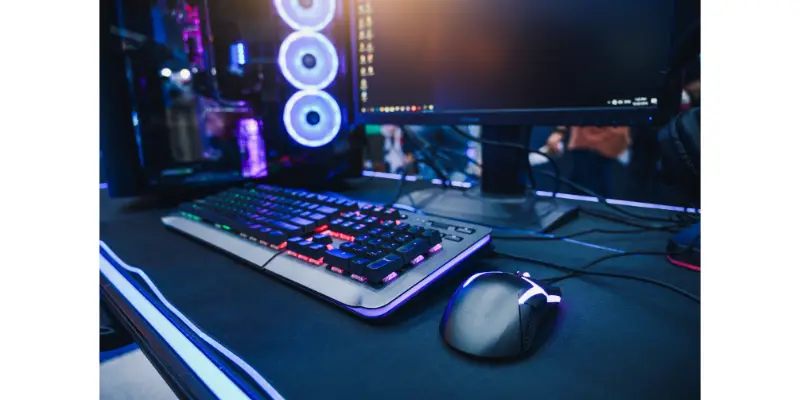Disclaimer: This post may contain affiliate links, meaning we get a small commission if you make a purchase through our links, at no cost to you. For more information, please visit our Disclaimer Page.
Laptop or desktop – the never ending debate among pc owners and a topic that most would-be pc owners have lamented. In recent times, however, the conversation has shifted from which is the outright superior technology to which equipment is best suited to your needs. So, should you get a laptop or a desktop computer?
Laptops are ideal for on-the-go users, who will benefit from their portability and battery life. Desktops offer more power, better customization, and upgradeability, often at a lower cost. But they are stationary and need plenty of room. So, desktops are for users who need power over portability.
With the development of mobile technology in the past few decades, laptops are starting to challenge their bulkier counterparts in terms of power and performance. So, the matter of choosing one over the other depends on several different aspects.
And that is exactly what we will be looking at in great detail in this article. We will go over some of the common areas where both forms of personal computers are used and decide which situation is ideal for which device. Hopefully, by the end, you will have the insight to select the right computer for yourself.
Table of Contents
What Are the Advantages and Disadvantages of Desktop Computers?
As with any technology, there will be some negatives mixed with the positives. So, here are the benefits as well as some of the drawbacks of using a desktop computer:
Advantages
Desktops are big, spacious, and give more room to play with. So, manufacturers can put a lot more into a desktop. Hence, why they have a powerful GPU and processor.
Their substantial size also provides an easy opportunity for improvement. Most desktops will come with additional slots for RAM, SSD, and even GPU. You can easily take out the processor and upgrade it to the latest version.
Of course, you will be limited by the capacity of your motherboard. But even then, a desktop offers its user the chance to replace the entire motherboard if necessary. Most of these parts are in place with screws. So, accessing them and removing them is fairly simple.
Since they put fewer limitations on the manufacturer, their production cost is significantly less. So, the price of the final product is also low compared to mobiles and laptops.
Furthermore, they are easier to maintain and clean. And if something does go wary, you can repair the problem with much less hassle.
Typically, they will have a bigger and better display than most laptops or smartphones. And you have the option of increasing that size at your convenience, provided you can bear the expense.
Disadvantages
Unfortunately, the size of a desktop is simultaneously a positive and a negative aspect. You do not have much scope for moving this hefty piece of equipment. You need a dedicated area just to set up all the parts and plug in all the wires. And once set up, it is pretty much stuck there until you desperately need to move it.
Desktops rely a lot on wires. This can be a tripping hazard or a potential fire hazard. It is a particular problem if you have rodents in your house that will chew and destroy your expensive wires.
Also, desktops tend to make noise, sometimes very stressful levels of noise. This is a downside to the power it provides. All that power makes the computer hot, which in turn forces the fans to spin faster. Thus, creating a lot of noise.
What Are the Advantages and Disadvantages of Laptops?
Advantages
The biggest advantage of a laptop is its mobility and versatility. You are allowed to bring it with you to work or the campus. You can work on projects and assignments on the bus, train, or plane.
You do not have to deal with a ton of wires all over the place. You do not need to constantly charge the machine. It can run on battery power for hours on end. Perfect for when you are camping or working during a power outage.
And with how advanced laptops have become, you are not compromising on the power too much. At least the compromise is not as stark as it once was.
Also, laptops are quiet and peaceful; or most of them are anyway. They have their own mouse pad (I.e., the touchpad) and speaker system. And you will not need an entire desk or table just to house your computer.
Disadvantages
Due to the structure of laptops, most of the components have to be integrated very tightly into the motherboard. The graphics card unit (GPU), central processing unit (CPU), and even the RAM are frequently soldered into the mainframe. Since you cannot remove these parts, you will not be able to replace or change them.
Dollar for dollar, a laptop will cost you more. This is mainly down to the production cost. Manufacturers have to cram in a lot of components inside a compact space while keeping the level of performance optimum. This invariably raises the value of each part.
Laptops may come with a built-in sound system, but they will be less powerful than the one you will buy with your desktop once again.
Laptop vs. Desktop Computer: Which is Better?
Now that we have established the strengths and weaknesses of each device, let’s stack them up against one another to see how they compare.
Portability
Laptops are the clear winner in this category. After all, this is the primary appeal of using a laptop over a desktop. You can carry with you, work on projects and spreadsheets on the move, watch movies, play games, take part in video conferences at your convenience, etc. These are some of the reasons people use laptops in the first place.
And while desktop monitors and motherboards are no longer as massive or heavy as they once were, they are still pretty large. Plus, they do not have the luxury of running on battery power.
Processors
Even just a decade ago, desktops would have won this category handsomely. Since desktops have more room to work with, manufacturers can put more equipment inside them. You will often find extra slots for RAM, SSD, or HDD and sometimes additional GPU slots.
But technology has gotten smaller and smaller and so, laptops have become more and more powerful. There are some modern gaming laptops on the market that can rival even dedicated gaming desktops.
The caveat here is that those gaming laptops will cost you almost twice as much as a desktop. Since desktops do not have to put everything in a small package, their production cost becomes significantly less. And they are far easier to upgrade so you are never wanting for power.
Cost
Speaking of cost, a high-end laptop will have a higher price tag than a high-end desktop. We already went over how the production cost is lower with desktops.
Another factor is the availability of user-replaceable parts. Desktops are more flexible in this aspect and allow their user the freedom to customize it however they want. Laptop parts are more limited and hence, more expensive.
Internal Storage
Once again, desktops have more storage space due to their bigger size. Modern laptops can also have large storage systems. For example, the Alienware area 51-m can have a maximum capacity of two separate 1 TB SSD with an additional 8 GB hybrid drive.
But desktops often have additional RAM and SSD slots that can push their storage capacity way past most laptops.
Upgradeability
Besides the power aspect, this is the other major factor that gives desktops the edge over any laptop. Simply put, laptops offer very little room for upgrades and in some cases not at all.
The downside to their compact size is that they offer less in terms of power and upgradeability. So, most of the time you will be stuck with the internal hardware that you initially bought.
Desktops do not have this problem. The storage drives, processors, etc. are all inserted into sockets that you can easily access and then pull out that specific part. So, you always have the option to upgrade your desktop once more advanced equipment becomes available.
Set-Up
Those of you who have put together your own computer or helped someone else build theirs will know that setting up a desktop requires a bit of work. And if you do not know your way around the computer, this can be especially challenging.
With a laptop, you can just go right to the good part. You do not need any fancy setup or computer table, you do not have to deal with tangled wires, etc. You just open your laptop and start using it from the get-go.
Accessories
A desktop keyboard has more options and durability than the one you will find on most laptops. And you can choose and customize the sound system that suits your preference.
However, you can easily plug in a desktop keyboard or a powerful speaker system to your laptop anytime. In fact, there are many wireless versions of these devices that run on Bluetooth or wi-fi.
Screen Size
Laptop screens have to be smaller due to their compact nature. If you want a bigger screen, you will need to pay for an extra monitor.
Final Verdict
Desktops give you better power and performance at a considerably lower price. They are easier to maintain, repair, and upgrade. If you have the space to put it or want a computer that does not easily become obsolete when newer technology comes along, a desktop is your choice.
But if mobility and efficiency are your priority, you should always go with a laptop.
Are Desktop Computers Good for Work?
Most workspaces that employ computer operators will provide their employees with desktop computers. But how efficient are they for work-related projects? The answer depends entirely on your profession and the work that entails.
Desktops are enough to perform the majority of office work such as making spreadsheets or presentations, sending or receiving emails, storing data, organizing files, etc. Here, the stationary nature of desktops is beneficial as it provides consistency. You simply set it up in one place and return to it day after day to do your tasks.
If your work does not involve much travel, you will be better served by using a desktop computer. Since they are cheaper than laptops, companies can afford them for all of their employees.
But desktops will need a dedicated space in your office and sometimes that can be hard to provide. They can also generate an irritating level of noise, especially if the computer is old or has not been cleaned properly. This is why many offices house all the computers in a separate room so that their employees can work peacefully.
Are Laptops Good for Work?
Now, if your work requires you to travel and work on the go, a laptop will be ideal for your needs. You can work for hours without a direct power supply. So, even during a power shortage, your work will not be hampered.
People who have to switch between working from home and an office should acquire a laptop. Otherwise, you may need to invest in two separate computers, which is not possible for many workers.
Freelancers, bloggers, travel writers, journalists are some of the professions that are tailor-made for laptops. Because these involve constant traveling and immediately recording information.
Are Desktop Computers Good for School?
If you visit any elementary or high school with a computer laboratory, you will most likely find desktops set up for the students. And for good reasons.
Once again, this is because desktops are stationary and heavy. So, there is less chance that students may break it or misplace it. And these desktops are capable enough to teach students the basics of using a computer such as typing, sending emails, or doing rudimentary coding.
Desktops are especially useful for teaching younger students about computers and getting them invested in them. The majority of professional programmers and computer specialists had their first lessons about this technology through a desktop computer. We are willing to bet your first encounter with a computer was a classic desktop setup.
Now, people who are studying subjects such as computer science, analytics, robotics, etc. will need a very powerful computer. The normal PCs used for day-to-day activities are not sufficient to meet their demand. In this instance, desktops offer significantly more power and upgradeability.
Are Laptops Good for School?
College or university students will invariably go with a laptop as their PC. These students will often have group projects and seminar presentations that they will work on at home and on their campus.
So, a portable computer gives them more flexibility. Students can easily bring their laptops to campus, work on a project together, share notes, etc. They can even plug in the PC to a projector or a big monitor and give their presentation.
As for teachers who rely on a computer for their work, a laptop is almost essential. They can bring it to class to help their lectures or show the students an educational video.
So, if you are a student or teacher who wants quick and easy access to a computer at any time, a laptop will be an ideal companion.
Are Desktop Computers Good for Gaming?
Ever since the inception of computers, they have been inexplicably linked with gaming. Many people buy a PC just for this purpose. But gaming can offer much more than entertainment value.
Today, people use gaming as a means to measure the capability of a computer. Modern games are very high-tech and they require similarly powerful machines to operate them. Essentially, if your computer can run the most advanced games on the market, it can run pretty much any software.
Initially, computer games were almost entirely isolated to a desktop monitor. And despite the rise of gaming laptops, gamers still prefer desktops as the medium for their games.
This mostly comes down to two aspects – power and upgradeability. Desktops are almost always more powerful than laptops of the same price range due to their higher storage, better processors, and graphics unit. So, they can host a wider range of games and run them better.
Furthermore, the gaming industry is one that constantly evolves and adapts. New and better technology is coming out every year, which is making games more advanced. As such, the hardware needed to run these games is also changing all the time.
And this is where the easily upgradeable desktops stand out. They are very convenient to take apart and replace the older internal hardware with new ones. Of all the components you can change, the graphics card unit (GPU) and the processor are most crucial.
Basically, these are the two key parts that determine whether you can run a certain game or not. If your GPU is insufficient or the processor is obsolete, you cannot play newer games. But with a desktop, you can easily upgrade those parts with their latest versions. So, you do not have to buy a new computer every few years.
Other notable benefits that desktops provide are a large screen, keyboard, and mouse that are better suited for gaming, and a better sound system. All of this is why gaming desktops are so popular and so many people use them.
Are Laptops Good for Gaming?
There was a time when people avoided playing games on their laptops. They feared that playing high-level games would quickly drain the battery life and hamper the laptop’s overall performance.
But now we have dedicated laptops for gaming and gamers. Tech giants such as Alienware, Asus have been making laptops specifically for gamers for quite some time now.
Of course, these laptops will cost you significantly more than most desktops. And even the most powerful laptop cannot exactly match the capabilities of a high-end desktop. But now people can enjoy the latest games and visuals on the move.
The latest Alienware area 51-m has a desktop-level processor and runs on Nvidia’s powerful RTX series of GPUs. They can give many gaming desktops a run for their money.
You also have Asus’s Razer series of laptops that are not as powerful but incredibly lightweight. So, you can pretty much enjoy your favorite games anywhere at any time. This is perfect for gamers who constantly travel to take part in e-sports tournaments and such.
Plus, with portable speakers and wireless mouses becoming more popular, you can get the full gaming experience on a mobile setup.
Conclusion
In the end, whether you choose a laptop or a desktop is entirely dependent on your needs and budget. So, make sure you properly deliberate your current situation and then make the decision to get a personal computer.





